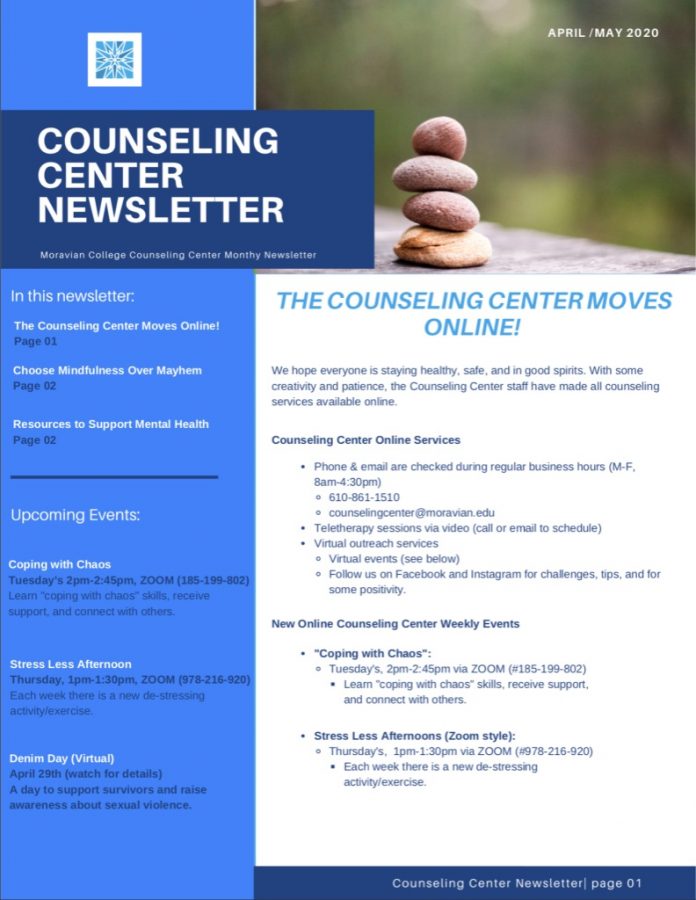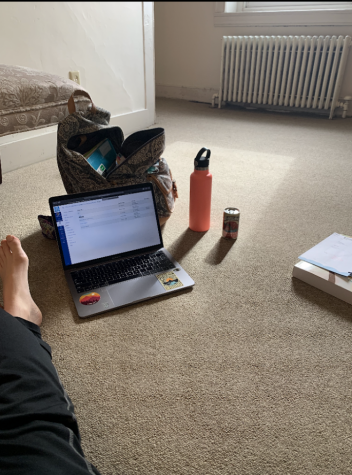Tips for Coping Emotionally with COVID-19
This time of uncertainty and confusion is hard on everyone in a variety of ways. And while some of us might enjoy being home, staying home may be a battle for others. Whether it is feeling some anxiety or feeling utterly hopeless, all of us are experiencing changes that can affect our mental well-being.
According to Moravian College’s Counseling Center, some common experiences that may indicate struggle are the following: , you know you’re struggling if you have the following experiences:
- Increased worry about your physical health
- Increased fear about what the future holds
- Feeling tired and unmotivated and sometimes guilty about not getting enough done
- Changes in eating and sleeping patterns
- Increased substance use
- Exacerbation of existing mental health problems
- Excessive worry about germs and contamination
The internet can be a blessing during crises like the coronavirus because it allows us to communicate with family and friends, as well as professors and classmates.
Take advantage of this and do not socially isolate yourself.
Play online games, video call with friends and family, even have a virtual date. Make sure to talk to others about how you are feeling. We are all home, and we are all struggling with this. But we do not have to face it alone.
On the other hand, the media and internet can be a curse.
We have been glued to the news and other reporting platforms and it is understandable as to why, but it is an unhealthy practice. Not only are these news sources filled with tragedy, but they are speculations and opinions blended with facts, making it difficult to tell the difference.
It is important to stay up-to-date on the news, but the Counseling Center recommends limiting it to one or two reliable sources that focus on facts alone. It is also advised to only check these sources once daily.
Rather than only viewing news that is doom-and-gloom, look for positive news sources focusing on the good and uplifting things that are happening. Think broader than the here-and-now; find the bigger picture in all of this.
The Counseling Center instructs you to challenge any negative thoughts you may have with facts and question if such negative thoughts are useful to you. Ask yourself, “is this thought helpful or productive?”
A good skill to develop, not just for the current situation but for life in general, is a tolerance for uncertainty. There are many resources online that can help increase resilience.
There are many aspects that we simply cannot control during this pandemic. Understanding and accepting it can be quite difficult for some individuals. If you find yourself struggling to do that, try to focus on what you do have control over.
Regarding the coronavirus, you cannot control other people and their decisions, but you can control how well you follow social distancing guidelines and CDC rules. Instead of focusing on what you are unable to do during the pandemic, focus on what you can do.
As we near the end of the semester, many of us are drowning in work and stress. Some of us are still working a job, which can be scary during the pandemic. The Counseling Center advises us to keep work life and home life separate, and to set healthy limitations for when you work and how much you work.
A fairly easy way to monitor your work is developing a schedule that is structured and concrete. When you create this schedule, make sure that it can be achieved. All of the professors understand that these are difficult times, so do not push yourself beyond your ability as this can be unhealthy.
The schedule you create should include downtime for healthy relaxation. Healthy sleep patterns and eating habits are helpful points of focus. For more in-depth information on constructing a schedule and other planning spreads, you can look at bullet journaling.
In the schedule you construct, you can also plan and track your physical activity. Exercise every day so you can start to feel better from moving more. It is not healthy to be on the computer all day or sit at a desk for hours on end doing schoolwork.
Of course you can exercise in your living room, but you can also go for relaxing nature walks, as long as you continue to follow rules on social distancing.
Being in nature can be very beneficial for mental health, even if it is simply opening a window to enjoy some fresh air. Take a moment to really breathe and be mindful of the environment surrounding you.
There are countless online resources on mindfulness, meditation, and grounding exercises. One of the most common grounding exercises practiced is the 54321 Method, which goes through the five senses: name five things you can see, four things you can feel, three things you can hear, two things you can smell, and one thing you can taste.
There are so many activities you can do while home, and there are countless online resources for this as well. Virtually tour a museum or visit a national park. Pick up the book that’s been sitting on your shelf, waiting to be read. Learn a new language. Make up a language! The possibilities are endless.
In these difficult times of uncertainty, it is so important to have a sense of community, even if it is from a safe distance. Do not forget those around you who are struggling and may be more vulnerable. Remember to practice altruism: be kind, caring, and compassionate. Even during quarantine, you can volunteer and help others.
Do not forget your well-being either. Everything you may be feeling is valid and normal. In a short period of time, so much has happened, so it is normal to feel tired. Everyone has lost something, and it is not selfish to mourn this. Just like any loss, you must give yourself time to grieve.
Not only are these feelings common, but they are expected. No one has gone through anything quite like this, so it is normal to be confused, irritated, anxious, and sad. Expect to have moments with these emotions and be kind to yourself. The situation is not normal but your reaction is.
If you are feeling overwhelmed by these emotions during this time of uncertainty, seek professional help. Though we are all home, guidance is still available to help you navigate this difficult time.
You can find a local clinician that accepts your insurance by visiting your health insurances provider’s list. You can also find a list of local clinicians by visiting psychologytoday.com. Many clinics and offices are currently operating virtually, or at least provide it as an option.
Moravian students can and should contact the Moravian Counseling Center by emailing [email protected]
Here are some other resources:
National Suicide Prevention Lifeline: (800) 273-TALK (8255)
Suicide Prevention Resource Center












